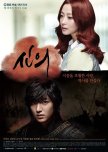
An epic historic love story, playing with time and space. Waggish. Affecting. Wonderful acting.
A special dramaturgical drive given by time travel and parallel worlds are quite common in KDrama. Thus contrasting perspectives from different backgrounds quite regulararly add unconventional fun and extra thrill to story dynamics.Additionally, KDramas like to chose a historically exotic context for its intriguing and romantic stories, while still giving them an epic scope. Even if not always historically exact, these plots offer plenty of material for drama and at the same time convey historical facts and heroes in a colorful dress. Epochal personalities and their impact come to life again. As Korean history goes far back in time, there are yet many more heroic stories to be told...
"Faith or the Great Doctor" combines both, the historical approach as well as playing with time and space in one story. In fact, history is thus presented even more funny and colourfully. On the historic side, this KDrama revolves around the legendary General Choe Yeong (1316-1388) who went down in history as the protector of the Goryeo Empire and its royal family. Incidentally, this is not the only KDrama that has been dedicated to him to date... As early as 1983, a series monument was erected for him in "Gyegook" and "Chu Dong Mama". He is also featured in "Tears of the Dragon" (1998), "Shin Don" (2006), "The Great Seer" (2012), "Jung Dojeon" (2014), and "Six Flying Dragons" (2016). You guessed it, he´s a real hero for the Korean Peninsula.
-------------------- SIDE NOTE: --- General Choe Yeong ---
Known for his strength from an early age, the son of a civil servant learned martial arts and studied books on military strategy. Over the centuries he had finally achieved the status of legendary protector of the Goryeo dynasty. Although he was also exiled for 6 years due to intrigues, in the course of his life this did not prevent him from fighting around 80 more battles in the service of the king. He lost his last battle against his former brother-in-arms, General Yi Seonggye, when he seized power in a coup d'etat in 1388 during the Battle of Liaodong. This was also the birth of the Joseon Dynasty.
-----------------------------------------------------------
"Faith or the Great Doctor" traces the path and integer character of Choe Yeong, whose motto has been handed down as "consider gold as if it were a stone". It´s obviously not pure poetic freedom when he is portrayed as sincere, stylish and gallant. And also does his combative superiority not seem exaggerated - his skills are historically documented. The focus of this KDrama is rather on the young general. He is not only presented as a strong leader, but as a young man who falls in love with a woman who is almost 10 years older. This (fictional) constellation offers some extra driving dynamics to the romance - as well as a comparably pleasant maturity at times as well.
The title plays with the different language styles in Korean - the old Hanja, which was written in Chinese characters until 1443, and the Hangul writing, which was newly created during the Joseon dynasty (and in which many Hanja terms have been preserved to this day.) So the original title "Sin-ui" may be understood both as 'trust in law and order' or as 'gifted healer'. In this sense, the title not only values Choe Yeong, the protector of law and order in the Goyeo Empire (refering to the Hanja translation), but also the gifted female healer (refering to the meaning in Hangul) - Eun Soo, a cosmetic surgeon from Seoul in 2012.
In the midst of waggish and heartbeat, this epic love story with all sorts of dramatic twists and turns absorbs within an eventful chapter of Korean history. The contrasts between modern and traditional medicine, somehow clashing in the middle of the 14th century, as well as between the almost rebellious, outrageous self-confidence of the by modern Seoul life spoiled doctor Eun Hoo and the ancient court of the Goryeo royal family guarantee 24 episodes of evocative entertainment.
"Faith or the Great Doctor" is an epic historic drama and at the same time playing with time and space. With two wonderful leading actors and more. The perfect mix for an epic Rom+/-Com.
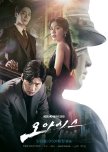
ambivalence
"Oasis". Hm. I've thought whether I should continue watching or drop the series... I've also considered more than once whether I want to write something about it... My feelings about this KDrama are ambivalent. However, the ´why is this?´ , is why I actually consider it worth mentioning.Sure, there were bumpy details, like the boys' artificial skin tanning when they were young, but I don't want to dwell on those.
>> The decisive factor for me, not rooting so much for this show, was and is that I really do NOT care so much for ANYBODY in this story. I understand, yes. There is empathy, yes. But sympathy? I couldn't care less. I've never had that before. I actually didn’t care. Neither the love story, nor the incorrigible rival, nor the girl wanting to bring back her father's cinema – this all and more only had limited impact on me. That's why I was tempted to turn my back on the story. Yet, I don't want to deny the actors' ability. I would do them injustice. They did their job fairly well. There are a number of strong moments. But still, maybe they were not the perfect cast? In any case, I would argue that in “OASIS” the character portraits were simply NOT drawn that well. ...In my view, that's obviously NOT the strength of the script...
Then there is the historical context of the series – the rollercoaster ride of the 80's and 90's. In South Korea, they are the neuralgic interface between dictatorship and democracy. But I don't want to dwell on this either.
>> What was decisive for me was that the STORY of the KDrama really mattered to me – whatever triggered the dynamics, the twists and turns. Intertwined with it were indeed countless moments that touched me deeply. Starting with the seed that underlies the whole drama: the fatal loyalty of the former slave not only to his deceased master, who had fought for independence, but also to his son, whom he now still serves as a free man. And then also the fruits that came out of this seed. Plus a lot more. The circumstances, the constraints, the social context that shines through in how it shapes (or had shaped) people, all of this really had me .
The way these forces of time and history run along in the background as a matter of course and keep stirring up the lives of the protagonists at crucial points, I think the script did THAT quite well. (However, I don't know whether it would have worked that way if I hadn't already known something about the political and social context back then.)
Maybe I could summarize: The portrait of how the historical dynamics are intertwined with personal destinies is well done in "Oasis". The character portrait of the comparatively stale protagonists, on the other hand, is less so. This discrepancy, resulting in my rather indifferent experience of the main characters on the one hand, and the emotional force with which the story keeps lashing out on the other hand, is a phenomenon that I have never experienced in a KDrama before. (But I don't necessarily assume that this has to be the same for others as it is for me.)
Eventually, despite the ambivalence, I watched to the end and was always curious to see what would be next. I can't say I regret watching either. But then I wasn´t all that happy in the end - even though I was partially impressed by the showdown, (yet, again, only partially.)
----------------------- Tiny side note: -------------------------------------
Re: 80's and 90's:
In connection with e.g. the KDramas "Sandglass" and "Giant" I have already given some of the political coulors of the 1980s and 1990s. Much of this applies to the historical context of "Oasis" as well. (you might want to check there.) Here, though, the dubious role of the secret service comes more into focus.
Re. Movie theatre:
The dictatorship was characterized by censorship. In addition, there was no freedom to travel. Accordingly, the cinema was like a window to the rest of the world, and generally offered a canvas to dream away from one's own misery, at least for a while. That may be more or less true wherever you look on this planet. But in South Korea at that time certainly more than i.e. in Europe. The role of the ´cinema´ in "Oasis" not only coincidentally represents liberation (struggle - especially of the female protagonist).
---------------------------------------------------------------------------------
Ps.:
Because of this KDrama I stumbled over another one - same title, 20 years older: "Oasis (2003) " or "Desert Spring".
I am grateful for this discovery thanks to the name-connection. Actually I liked that older one (despite the specific doing of that time) even more...
Nevertheless I consider "Oasis" (2023) having its moments, too...
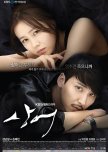
A shark may not be able to generate suction, but "Shark" can very well do so !
The title "is an allegory and a leitmotif - be it the original title "Shark" oder the sometimes internationally also used title "Don´t Look Back: The Legend of Orpheus".The latter not only alludes to the ancient legend of Orpheus, but also to Marc Chagall's painting of the same name, which can be found in the KDrama as a leitmotif, too. It basically describes what this is about. As far as the mythology is concerned: Ultimately, Orpheus never gets his great love Eurydice back - even as tries to return with her from the realm of the dead, he unfortunately doesn't manage to do without "looking back" (the condition for the rescue to be successful). In relation to the story of the KDrama, this could mean: the protagonist would have to give up his revenge - his being stuck in the past. And that brings us to the core of the story: revenge.
The original title "Shark" refers to a second leitmotif: Since childhood the protagonist feels a great affinity and sympathy for this particular predatory fish. Ocean sharks must always be on the move. Their mouth remains open so that fresh, oxygen-rich water can reach their gills and they are able to ´breathe´. Not moving means no fresh oxygen supply and thus their certain death. This implies an inevitable activity at all times - consequently they are always dangerous. Ocean sharks are loners, too. At most they join together in groups for hunting. In this respect, the story is set in the world of powerful, highly influential Jaebeol, whose machinations tremendously drive the Wheel of Fortune. They never stop shaping the world at their will, regardless of the cost. The protagonist courageously competes against one of the really big ones (actually against two). There is plenty of manipulation on all sides - as if you were pulling the strings of puppets. Sometimes one might think of vodoo dolls... Police and lawyers are breathlessly chasing behind the events. (It came at a time when bribery and corruption in South Korean business and politics was still more common and taken for granted than nowaydays. It was only a couple of years later that even the head of state was accused of being part of a shocking network controlled by Jaebeol bribery. To that extent the KDrama was just on spot at its time.)
"Shark" offers a fine study about injustice trying to be compensated by vigilantism. However, making amends is not possible. The protagonist's father is and remains dead. Revenge isn't that easy either, because in the course of his chess moves the protagonist stumbles over truths he didn't expect and a love that could get in the way of revenge plans. (Somehow Orpheus is whispering into the protagonist´s ear: "Do not ´look back´!", e.g. let go of revenge and vigilantism...)
The shark (as an animal) may himself not be able to create suction (for breathing), but the KDrama "Shark" can do so very well. The soundtrack sets the rhythm, the melody burns in, the events take their course and you always want to look around the next bend to see what might happen next. Although the good guy is the bad guy, you're feverishly at his side. And on the side of the bad guys, there are the good guys too. What to do with morals...
"Shark" gives practical insight into the early hours of the Jaebeol and their machinations over time. The roles of their long-term companions, who knew them from the earliest hour before their rise as Jaebeol, are also highlighted (e.g. their companions, today assistants, secretaries, drivers, lawyers, etc.). With those they have come a long way and so the know each other, like no other).
"Shark" is more on a tranquil side and maybe less colourful than other KDramas. Both background and heart of this KDrama with its characteristic tinting are set by the tender childhood love - between the Jaebeol´s grand daughter and the driver´s son... The differentiated side plots also keep viewers on their toes. ... It remains thrilling until the end, when open questions are answered.
Mercilessly the wheel of fortune turns, over 20 episodes. The premonitions of the first scenes are set ´today´. Then, in retrospect, the emotional relationship between the protagonists, what happened back then and where they are coming from is portrayed via their youth experiences, before the today´s storyline is picked up again.
Some call this KDrama a masterpiece. I am one of them.
Yet the whole is as often more than its parts. If you are primarily in it for the romance you might be disappointed in the end. Rather against the setting of this love story the KDrama is giving insights into the careers and backdrop of the shiny Jaebeols´ shady practices. In return on this solid drama-soil the emotionally challenging processes of those two ´associated in love´ unfold...

Giant is an epic about the life&love of 3 siblings during highspeed urban development of Gangam
"Giant" offers a dramatically stirring ride through 4 decades of recent South Korean history - 60 episodes tell a touching, upsetting, emotionally stirring and complex story set in the context of a turbo-fast urban development process in Seoul, south of the Han River: Gangnam.In passing, those episodes tell the story when Seoul and its people had to deal with a phenomenal population explosion: in 1953, 1 million people lived in Seoul. In 1960 it was 2.45 million and in 1970 it was already 6 million. Visions and plans were in demand, as were quick practical solutions and investments. Real estate speculation created a veritable gold rush atmosphere. "Giant" is about these 'gold diggers' in particular. (...and this hype about real estate speculation in Gangnam hasn't stopped until today...)
"Giant" is an epic. It is a monument and a memorial to the efforts and sacrifices of many people. The autocratic (and also often corrupt methods) of urban development become comprehensible if one considers them against the background of their time: the military dictatorship, which was inevitably characterized by the powerful influence of persons with military background in political and social decision-making processes (if you like see side note below). Instead of technical arguments and detailed examination, influence, money, bribery and position often had the say at the crucial interfaces.
If you pay a little more attention to the seemingly irrelevant details, "Giant" provides a crash course in recent South Korean history. (If you don't know or care about it, some things might be rather arbitrary or interchangeable.) In any case, the series has reached the South Koreans. In the course of its success, a further 10 episodes were added to the originally planned 50 episodes. For 40 percent of the viewers, "Giant" ranked first at the end of the 60th episode in 2010.
Ok, admittedly, there are 60 episodes. But when the time is right, you can confidently get involved. "Giant" is worth seeing. The story is told in a colorful way and played fantastically. It is emotionally gripping, touching, exciting. We accompany the protagonists over almost half a century: from their childhood in the 1970s to the year 2010. This means that actors can also show what they are made off by playing the protagonists as young. (Today they are stars of the 2020s: Yeo Jing-goo and Kim Soo-hyun). All in all, without exception, everyone delivered a strong performance. Last but not least, villain number 1, Jeong Bo-seok as Jo Pil-yeon, who holds his role brilliantly from the first to the last episode, is vividly remembered with his ice-cold laugh, which never got stuck in his throat - even in the most adverse headwinds.
The KDrama takes a sophisticated approach in telling the historical events and dynamic processes of the time through the eyes and hearts of three siblings. So, we tightly follow these stirring personal processes on the one hand, and several dubious machinations of the (fictitious) masterminds (who are quite close to the real events - see below) on the other. Against the historical background of those decades, in spectacular loopings the dramatically revolving wheel of fortune is allowed to turn to the fullest again and again, emotionally throwing the audience wildly around. KDrama shows it all.
"Giant" offers numerous stirring twists and upsetting turns in matters of love and rivalry, guilt and atonement, revenge and forgiveness. It won't be boring. All this surrounded by an indeed spectacular Gangnam urban development dynamic - at a dizzying high speed from no man's land to the hip trend district - which was not least favored by the autocratic control.
-------------------- SIDE NOTE: --- Gangnam highspeed development thanks to autocratic urban development during military dictatorship ----
There are details of everyday life during the PARK DICTATORSHIP: the influence of the military in all sorts of social issues, the secret service KCIA, which interfered unrestrainedly in domestic political issues and investigations and even used torture to interrogate people. Positions of power, like mayors, being appointed according to their military background and the level of their allegiances with Park. The backroom networks where the places, where the real decisions were made.
There are details of the subsequent DICTATORSHIP under CHUN DO-HWAN: the curfew during the state of emergency under martial law, for example. The brutally crushed democratic aspirations. The establishment of educational concentrations camps - "Giant" refers to the Samchung Camp in Yeoncheon, Gyeonggi, which was set up under the guise of fighting the threat posed by North Korean Communism. In this peculiar concentration camp, at least 60,000, probably even up to 100,000 innocent South Korean citizens were held captive in the former military prison under the most brutal conditions without an arrest warrant. There was talk of 'cleansing'. In fact, it was pure arbitrariness, verging on sadism.
And finally there is TRUE DEMOCRATIZATION of the system after the first free election for a long time - however, sadly, being faced with the same personnel (in autocratic tradition) in decisive ranks.
It has been proven that the military past in many political leadership positions during the Park dictatorship was not accidental but intentional. Among other things, of 6 Seoul mayors of that time (these were appointed, not elected), 3 had a military background. The other three were known for their expressed loyalty to the Park regime. Such people of Park's trust got the chance and used their past, their networks and opportunities as a robust standing, from where they set visionary course for the future of the capital with all means. Otherwise, rarely had the urbanization of Gangnam been as rapid as during those decades.
Gangnam beauty industry, the relevant corporate headquarters of the KPop industry, the suites and penthouses of the richest of the rich in the most exclusive apartment blocks of the country, temples of consumption of numerous luxury brands, hotspots for leisure and culture as well as some of the most prestigious schools contribute to Gangnam's dazzling image today. Gangnam with a population of over 1/2 Million recently is one of the economically most important urban districts of Seoul, in whose towers, which rise ever higher into the city sky, the very large companies of the country have their headquarters. A central transport hub has emerged and even the Ministry of Trade, Industry and Energy has taken political presence here.
It's hard to believe that 60 years ago this district south of the Han River (강 - Gang = river and 남 - Nam = south) stood for flood plains and agriculture - especially cabbage fields and plantations with the Korean Nashi pear. It was an unattractive no man's land, considering you want urban city life.
This had changed in the 1970s after Seoul faced a massive population explosion, the consequences of which the city could not cope with under the given circumstances. Previously, the city's political, economic and cultural heart had been on the north bank of the Han River in Gangbuk - in fact, since the dawn of the Joseon Dynasty. But between 1953 and 1960, in just 7 years, the population had more than doubled, practically 'overnight', from 1 million to 2.45 million. In 1970 it had already reached around 6 million! Nobody had been prepared for this. Chaos was the result. Infrastructure collapsed, slums literally sprouted out of the ground.
That's when the vision of a whole new district south of the river was born. In 1966 it was announced for the first time that the population should be redistributed in the future: 40 percent of the population should live in the northern area, 60 percent in new and densely built Gangnam. A dream in distant clouds, that's how it seemed back then, because there was nothing there at that time.
In the 1970s, the planning took on more concrete forms. Gangnam has been defined as one of Seoul's 3 central urban cores alongside the historical old town and the political center of Yeouido. In order for this to happen, construction of today's Hannam Bridge had already begun in 1966. In 1969 this important connection was completed and the first milestone was reached. Also, the Gyeongbu Expressway was opened in 1970. However, to speed up the development, Gangbuk was deliberately disadvantaged and Gangnam was privileged, for example with tax breaks. An express bus terminal was built, elite schools were relocated and comfortable new apartments were advertised. Stylish urbanity was marketed on one plot, yet rural wasteland was right next to it. The contrasts were enormous.
Yet, residential buildings started to grow at breakneck speed and people began to move to the new southern neighborhoods.
Strictly speaking, Gangnam and the education of an elite school district also marks the beginning of the now enormously profitable private education market and some social excesses, which to this day provide the KDrama market with plenty of material for the most bizarre stories. In addition, speculation in real estate became fashionable and became a new hobby for (more or less) rich wives. Eventually, Gangnam also earned its reputation as an entertainment district, with clubs staying open all night.
The story of Gangnam reads dazzling and spectacular. But the city itself initially had no money for all the investments that were necessary to develop the land. It relied on income from sale of the land set out for recompense from the land readjustment programs. All started slowly, because interested buyers withdrew, disappointed since there was hardly anything really urban in Gangnam in the early 1970s. In order to speed up the processes, a law was passed in 1972 that deliberately relaxed the existing tax regulations relating to property regulations. From then on, profits from real estate speculation were practically tax-free. Trade tax, property tax, etc. were also waived for the next 6 years. This temporary incentive for investors proved extremely successful, but also problematic. This brought speculators onto the scene, who didn't care at all about professional urban development as such.
Thus, remarkable performance comes with sad collateral damage. The catastrophes associated with sloppiness in construction and human fault in the wake of corruption pave the decades just as much as the milestones of urban development. The biggest accidents in this context were, for example, the collapse of the Wawoo residential complex and the Seongsu Bridge. (Others followed at regular intervals. Every decade has its own list...)
Autocratic regulations, the need for speed and the money involved also encouraged flourishing and unchecked corruption regarding insider trading with real estate speculation, building tenders and bidding. Bribery shaped the entire business world. This also promoted a climate in which - if someone was convicted of his illegal activities - he (usually a 'he') was easily released soon later on.
While the giants were able to pocket their gigantic profits without restraint, the population of Gangnam suffered (and still suffers) from housing costs that exceed every measure.
Finally, within this whole developmental process, the lending business has been a crucial and lucrative business since the very beginning until up to date, even if customers and their needs may have changed in the meantime...
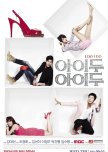
Within the aura of a love story some socially critical topics on successful woman, work & family
"I Do I Do" tends to be humorous, offers a nevertheless emotional love story and at the same time the backdrop for the critical processing of a merciless everyday professional and living environment to which women in South Korea are exposed. As also, for example, "Romance is a Bonus Book", "Scent of a Woman", "Revolutionary Love" or "Angry Mom" the KDrama uses the comedic touch to lift the emphasis of the topic into a lighter tone that is easier to digest. Cheerful and serious aspects are well balanced, also thanks to a great cast.
Within the aura of a love story "I Do I Do" comes along with some socially dominant topics around woman, work and family that want to critically be processed. "I Do I Do" precedes "Now, We are Breaking Up" by nine years. Not much has changed in the status of the professional life of a successful woman (in the fashion scene). The scenario reminds here and there: the experienced, successful and talented designer (here elegant pumps) who has chosen career over relationship/marriage/family; the parents who want their daughter to finally get married properly; a younger man who, after a one-night stand, throws the orderly life of the confident businesswoman upside down. In the case of "I Do I Do", the protagonist ends up in a one-night stand, which is rather untypical for her (and him) due to a chain of special circumstances. The hook for further drama is her completely unexpected pregnancy. ... and 37-year-old Hwang Ji-ahn, still being single, having just been medically diagnosed with a premature menopause...
------------------------------- SIDE NOTE: --- Woman, Work and Family as far as South Korean society is concerned ---
- A woman (in South Korea) can perhaps be successful, but the price for this is her woman-ness (as in many places on earth...). She proves herself to be a better man and simply has no room for relationships where she could live out her soft, tender, feminine side. Showing her weakness at work whatsoever would jeopardize her position. Competitors are already waiting for a devastating neckbutt.
- A woman can be excellent and even unique in her work. From a marketing point of view, however, it is more promising (because it is more binding for business partners) if a man bears the official, managerial responsibility for business sucess... because who knows when the woman will leave the professional world behind and take up her role as wife and mother... The dramaturgical dynamics in this regard are astonishingly differentiated in "I Do I Do". There is even room for the aspect of how women envy each others decisions for either way (instead of solidarily supporting each other - here and there).
- A woman should get married. She can mercifully let off steam for a while in her professional life, since society has already become about 10 years more tolerant in 2012 than in the decades/centuries/millennia before. But the age of 37 is (biologically speaking) a magical limit... because now it's high time. (The KDrama actually offers an exceptional man as a role model who thinks progressively here...)
- Dating, a woman automatically becomes the one who needs/wants to be protected and the one who in turn provides the man with allround care. What a mess, if roles lose their clear assignments. Here, too, the KDrama offers, among other things, another (different) exceptional male role model - one who (although instinctively a protector, too, but nevertheless) is ready to develop in a different way.
- And then equally valid for men and women: relationship is not a private matter. At least the parents are the first to have a say.
-Also: The greatest happiness in life should be a permanent position. Everything else is extra...
---------------------------------------------------
"I Do I Do" defies these societal norms, which in South Korea seem to be chiselled in stone. This is no piece of cake. Interestingly, the KDrama offers only one answer to the question "What are the arguments in favor of deciding to have a child or a family as a professionally ambitious woman?" - this in the face of an almost endless list of reasons that argue against it... This single commitment to a "yes" (towards children and family) is located beyond rationality. This "yes" has nothing to do with virtue and values. This one and only "yes" argument is completely personal. (My respect for taking such a position - one that actually stands outside of society´s right to have a say in this!)
After all, "I Do I Do" eventually shows another variation in the Cinderella spirit of fairy tale love stories ... But. I consider the way as the goal! And the path described in this KDrama (the circumstances and processes of the main protagonist) makes it definitely worth seeing. In addition, Kim Sun-ah finds a good balance between a competent, unapproachable boss and an approachable, not so competent 'woman' with her heart in the right place. Lee Jang-woo also convinces me here in his role as the much younger, impulsive, unconventional Park Tae-kang.
By the way: Since it is about the world of fashion designers and pumps in particular, it would be worth mentioning that the viewers get to see a lot in this regard. Not only in Ji-ahn's well-stocked private shoe room, but also beyond that - 500 pairs of pumps were brought up for the series that were supposedly worth almost 9,000 euros. Also, the protagonist Ji-ahn's individual fashionable style (which goes back mainly to Kim Sun-ah's specific, personal suggestions) became a trendsetter at the time.
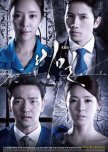
An inverse function... Consider the journey the reward. Truly captivating.
Two core components of KDrama characterize the recipe of "Secret": Firstly, the rich and powerful can obviously get away with anything. Secondly, a secret not only changes those who know about it, but eventually comes to light. Yet the brilliant mixture of this pastry makes the difference: the fatal initial constellation of the relationship dynamics is so cleverly shifted, twisted and tricky in several emotional loopings that the emotional world is completely turned upside down - an inverse function...For quite some time I avoided this KDrama, because (from the description) I thought I already knew how the story was going to go. ...Quite familiar, already seen many times... However, at some point I just wanted to have a glimpse (probably because of Ji Sung). What a surprise: it was truly captivating...
Moments of foreboding and predictability, yes, there are. But believe me, that doesn't stop you from wanting to see HOW things in their complicated entanglement can still turn out for the best. On the contrary, you CAN´T WAIT to experience that! The destination may be known, however, consider the journey the reward.
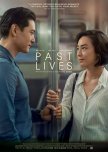
About a great service of love AKA a fateful, karmic relationship
"Past Lives" is a US production. Both the author and the two 'Korean' leads have Korean roots, but they did NOT grow up in Korea, nor do they live there. The story is autobiographically inspired and is dramaturgically presented in authentic dialogues on the one hand and selected, visually impressive sets on the other. It is about the aspect of fate (and or Karma) in encounters as well as pondering platonic love. "Past Lives" is indulging into the emotional world of more or less accountable and sensitive reflection of the protagonists, especially of those two extraordinarily mature, fine young men. You rarely see that. Additionally, as far as camera work was concerned, light and perspectives were chosen with care and thus implemented as supplementary actor, sort of. All this is quite wonderful and has already been widely praised. “Past Lives” is thus a movie well worth seeing.This movie presents South Korea and an attitude towards South Korea through the eyes of a South Korean girl who during the 1990s emigrated with her family at the age of 12. She then grew up in Canada, tried her luck as a playwright in New York, married an American, received the green card as side effect, and is ambitiously seeking recognition and success as a writer today. “Past Loves” thus has its positive emphasis on life in the US. The protagonist´s family had turned their back on South Korea. However, besides everything else, that has been already mentioned all over the place, I would say, that "Past Lives" is actually indirectly, in a rather subtle, reserved, unobtrusive way, (almost overlooked and hidden underneath the shiny, promising dominance of the US,) about positive Korean specific qualities, too... Therefore…
Generally, “Past Lives" juxtaposes those two ´worlds´ rather dichotomously. THERE South Korea, the country of origin that was left behind - far away and rather in the background, in the camouflage colors of the military and surrounded by plenty of soju. HERE the USA - reduced to a highly stylized New York (and artist retreat on Long Island), that is bathing in beautiful light and selected colors. In several respects, the United States is presented as the unrivalled better choice.
However, we experience these worlds through the eyes of the protagonist. In Nora's eyes, South Korea stands for conservative narrow mindedness, constraints, lack of freedom (which to some extend is certainly true). The USA, on the other hand, for her is the symbol for freedom, creative power, partake (should, could, might as well…). Eventually, those world views turn upside down. These are prejudicial concepts, both of which are not generally correct, e.g. each not representing the whole truth.
So, KOREAN normal everyday life is portrayed as conservative, shaped by her parents perspective and Nora's childhood impressions of the 1990s: the young democracy, already economically shaken by the Asian crisis. Her parents were artists and as such one way or another most probably influenced by the shaky turbulences of pro-democracy movement of the 1980s. They wanted a fresh start. Yet, what remains in Nora's memories? Very vague memories of school days, of what was said at home, of the striking images that remain impressively to this day. Bottom line: 'Men have to do their military service.' 'People are conservative and unsophisticated.' 'Men dependently live at their parents´ home until marriage.´ ´You can´t proceed in life.´
On the other hand, NORTH AMERICA is the much-cited world of unimagined possibilities. For Nora specifically, it is about a liberal world for the arts. She´s dreaming about her successful future, while the ambitious daughter may actually be living a much wanted life in lieu of her parents, too, to a certain extent. However, this ambitious dream is symbolically captured as an aesthetically abstract decal of New York and the Montauk artist retreat. For Nora, the USA represent a possibility to fulfil her dream of international prizes as an author. Thus, the USA as the center of her life is uncompromising and practically non-negotiable. That's okay and understandable.
This South Korea in the movie has a strong touch of Nora´s own prejudices. Apparently, she never emotionally processed or reflected her relationship to her country of origin. A deficit, which may also narrow down the perspective of the audience. Therefore, I would like to stand up for positive 'Korean merits', which only shine through subtly. In fact, though, they are formative for the characteristic poetic quality of the story. They come along in the person of Hae Sung. Thanks to him Nora can finally hold the key to her emotional freedom in her hands. (Whatever she may do with it now...) Thanks to Hae Sung (so to speak) she got her story and thus her tremendous success as a writer and director, too.
If you don't identify with Nora´s enthusiasm for the US so much, it might be easier to recognize those ´Korean merits´. Hae Sung actually embodies the opposite of what has settled in Nora's mind about South Korea. He stands for a new spirit among the digitalized young generation - even though he is an engineer. She, however, sees what she wants to see, reducing him to military service, close family ties, his clearly structured career and his reserved answers to her questions about marrying or rather not marrying his girlfriend.
Nora overlooks the fact that in his half-hearted answers about marital responsibility he carefully avoids generalizations so as not to overwhelm her with his feelings for her. She overlooks the fact that Hae Sung is indeed the courageous creator of his own world, possibly facing life even more creatively and openly than she dares herself. He chooses to study abroad in China because he wants to learn the language and because it may suit his career, too. He is ambitiously following his career plans, just like she does. Nevertheless, he is open to life´s challenges and ready to completely turn everything upside down. He is actively dealing with what is going on between the two. He prefers not to go for a logical, reasonable marriage. Instead, he takes what his heart tells him, seriously. He wants to sincerely check it out. This makes him vulnerable, too. Actually it was him, who originally went looking for Nora. With courageous creativity he took the chances life had to offer in his own hands. From a practical point of view, HE thought creatively and acted courageously. Nora on the other hand was the one, who, to a certain extent, simply unwinds her program without looking to the left or right.
Back then, when she left South Korea, she just put her feelings away, came up with a new name, learned the new language and left her best friend (and Korea) behind like an old toy. Since then her feelings for her old homeland only slumber unconsciously in her dreams. In her life, which is highly concentrated on her career as an artist, her past and origins have not been given the place they deserve. Hae Sung has to come first to open the door to that forgotten dungeon of her heart.
Still, we don't know whether Nora was able to take the 'little one' in herself by the healing hand - the 12-year-old Na Young, whom she had left alone in the past. All we know is that Hae Sung gave her a chance to reconcile with her roots and a hidden, almost forgotten part of herself. His great service of love was: not forgetting her, not giving up on her; looking out for her; meeting her, too; recognizing her for who she is; reminding her of something else, that she had almost forgotten; and finally letting her be - in an understanding, loving, respectful, ´Korean´ manner. Even if it hurts.
Actually, being himself, he represented another powerful aspect of South Korea, that Nora had so far not realized as such: A finely nuanced, rather emotionally dominated and yet respectful attitude towards life. This in contrast to a rather dichotomously shaped - black/white, good/bad, yes/no -, rather reasonable approach towards life, as it radiates from her 'North America'-concept.
At the heart of "Past Lives" is the probing of the protagonists' feelings for each other. What are those feelings supposed to be? Platonic maybe? Or more than that? And of course the story lives from the attraction of 'What if?'. This careful scanning of a space of potentiality is processed aesthetically cultivated, and stylishly. Respectfully too. Finally there are tears. ´Past Lives´ it is… However, the striking poetic aspect of this story is only made possible (in my opinion) by this very South Korean Hae Sung, who is not afraid to meet the multilayered complexity of emotional depth, confusing affection and difficult challenges in life, and (!) who is also not afraid to back off in respect to a larger context either. Thus he eventually even provided her on the silver platter of his heart with the so much longed for international artistic success...
PS:
Must be the 'In-yeon' they keep talking about throughout the movie...
--------------------------------------------------------
SIDE NOTE:
In-yeon = a fateful, karmic relationship
--------------------------------------------------------
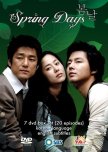
There are times, I think, when nothing beats a KDrama from the early 2000s
"Spring Day" is a love story told in a triangle. So drama in drama feels right at home here. And "Spring Day" has a lot more to offer in the proven makjang-mix to really heat up the story. If the merry-go-round isn't going straight forward, than simply because it's going backwards.Three is one too many. Being well aware of the consequences and where the story must lead towards, it is nevertheless the path that paves the series pleasure of cathartic ups and downs. You can get really upset about this and that. The rhythms of the soundtrack whip your emotions through the most varied of situations. The assorted mix of (by now long) proven actors give the protagonists their three dimensional profile. None of those characters is really grippy, smooth or edgeless, though. Whether brotherly relationship, romance or parental relationship, it´s all full of sometimes touching, sometimes pathetic ambivalences – sometimes hurting, sometimes soothing and hurting at the same time. In short, the KDrama presents quite some space for compassion and catharsis.
There are times, I think, when nothing beats a KDrama from the early 2000s. I couldn't have timed my ´Spring Day´ better (in Spring 2023). After a flood of stories about contemporary scheming, autocratic backroom politics, bullying among students and misogyny, "Spring Day" feels like an island in many ways. The world is not safe there, on the contrary. Makjang rocks the turbulence upwards. Nevertheless, there are 'only' personal destinies and family tragedies here that do not have the social impact of some current series topics. We get thrown around in an ambivalent emotional swell between 'soothing' and 'hurting'. In the end the story is told to the end. The ending may or may not please, but it has its ending. (A lot of recent KDrama with current underlying social issues tend to deep down leave a thorn after the end of the story, as the social swamp that fueled the story remains a given reality and lingers on…)
------------------------------------------------------------------------
By the way:
With "Spring Day" in 2005, Go Hyun-jung marks her comeback after a War-of-Roses divorce with a Jaebeol of the Samsung Dynasty. So in 2003 she actually had just finished her own Makjang drama personally. Eventually, she was able to free herself from the obviously tormenting clutches of her husband and his dominant, oppressive family, who (so it is said) permanently devalued her because of her humble origins, simply making use of her beauty for bearing pretty children. Yet the price for liberation was high. Above all, she had to leave her children behind and give up visitation and custody rights. Although she was able to re-establish her life somehow against all (by her husband´s family deliberately implemented) odds , she (so it is said) still is not allowed to see her children to this day.
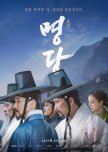
Everything stands or falls with the choice of an auspicious place. Insights into Korean geomanticsm
"FengShui" is a historical KMovie that addresses the political takeover by Heungseon Daewongun and his son, King Gojong. Even more, it deals with the Korean version of geomancy - Pungsu-jiri-seol = theory about the relation between wind, water and earth - which has accompanied the country across all dynasties since at least the late 9th century. The traditional theoretical concepts, studies and observations are about which constellations in the landscape bring luck or misfortune to people. In South (and North) Korea there is hardly any building, tomb, temple, or city that was not built from the point of view of Pungsu. To this day, Pungsu is still quite popular.Against this background, one could understand the movie "FengShui" as a nice, sometimes exciting story that comes up with a pointedly, rather apolitical, and for some even esoteric explanation about the ending of the Joseon Dynasty: At last, it was the (wrongly?) chosen location of the tomb that decided the end of the empire...
In any case, the story dramatically illustrates the importance of Pungsu to the people of (Silla, Goryeo, and) Joseon. And by the way, it gives an insight into the political situation during the last decades of Joseon. Without reference to this, however, one may be a bit surprised about the scramble for graveyards and also the struggle for power at the palace would be an interchangeable one among the many stories available on screen... No matter which glasses you choose, the cast in any case guarantees top-class performance.
Eventually, if you are interested in Korean society and history, the KMovie "FengShui" opens up an understanding of the great importance regarding the harmony (or disharmony) of human life with natural events (such as weather and seasons) as well as in relation to geographic features of the landscape (such as mountains and lakes and landscape) - as they are having a direct impact on human health as well as the fortune or misfortune of personal, family or even national fate. Everything stands or falls with the choice of an auspicious place (Myeong-dang) for one's own house, grave, market square, administrative headquarter, temple, fortification, palace, etc.
The teaching goes back to the Buddhist monk Doseon (826-898). He was a Daoist master and Zen Buddhist student who adapted the Chinese principles of feng shui to the Korean landscape and cultural environment. What is special about it is the concept "grow with nature", which in this respect focuses on an analysis of the spiritual and matter-related energies of mountains and landscapes as well as their effects on human life. (Interior furniture etc. plays a minor role in Korean pungsu.)
The KMovie "FengShui" puts a Pungsu master at the center of the story. Due to the more or less favorable choice of location, he can predict and influence how the fortunes of the people affected will develop. In this case, by using this knowledge to choose the most favorable burial site, he becomes a veritable kingmaker.
By the way:
All 42 royal tombs of the Joseon Dynasty over a period of more than 500 years are largely undamaged to this day. This is worldwide unique. All are arranged in the landscape according to the teachings of Pungsu - at most close enough to the capital for the royal family to visit the tomb within one day. (The concrete design of the complex was based on Confucian specifications.)
By the way:
The historical starting point of the story is the fact that Heungseon Daewongun, a central political figure of the last Joseon decades, moved his father's tomb on the advice of a Pungsu master. The new setting somehow promised that 2 kings would come out of his family. That was actually the case. But after that, the Joseon Dynasty came to an end.
------------------------- SIDE NOTE: --- Myeong-dang and Korean Pungsu ---
Pungsu officially goes back to the monk Doseon. But there are also sources that indicate that there was already a spiritual tradition with human-nature harmony on the peninsula, the aim of which was to efficiently balance landscape and topography, natural forces and sanshin (mountain spirits) in order to determine the fate of the purposefully influencing people.
Doseon's works have not survived. But his yin-yang geomancy was handed down in the works of later Confucian scholars. In the 12th century book "Haedong-Pirok" about the secret history of the country Doseon's theories were mentioned and even expanded. 5 centuries later, Yi Jung-hwan (1690-1752) in "Tangni-chi" analyzed the topography and landscape of the entire peninsula according to these geomantic points of view.
Central to this is the concept of Gi (forces of matter) as opposed to Li (forces of Heaven and Spirit). Mountains, and in particular the central mountain range that stretches like a spine across the peninsula, are the source of Gi. The energy flows, so to speak, from the mountains into everything that the landscape produces, into the water and into the air - all that nourishes the humman being. Gi thus becomes concrete and figuratively the source for a strong, happy people.
Another central concept is "Hyeol": a place of perfectly balanced forces of heaven (cheon-gi) and earth (ji-gi) from which people benefit the most. Such Hyeol with high, positive energy potential include, for example, Jiri-san's Cheonghak-dong valley in the south of Samshin-bong peak or the location of Buseok-sa temple on Sobaek-san. "Hyeol" actually means an ´opening´. Like the 9 openings of the human body, there are also openings in the landscape through which energies can enter and escape. If you like, Hyeol could be considered acupuncture points in the mountain landscape. Knowledge and control of Hyeol thus is highly related to power. A more ancient term for Hyeol comes from the shamanistic tradition: 'Myeong-dang', the (spiritually) lightful or auspicious place. The idea behind it: Bedding the ancestors at the auspicious place can bring prosperity, power and good fortune to future generations. Bedding the kings at auspicious places accordingly brings prosperity, power and good fortune to the nation.
...The KMovie is originally named "Myeong-dang"...
---------------------------------------------------------------------
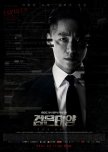
Captivating spy thriller, intelligently questioning the philosophy and ethics of secret services
"The Veil" is a really exciting, all-round first-class KDrama in the secret service milieu. The world of spies, the unconditional obedience to orders and professional ethics as well as the swampy terrain surrounding ´right´ vs. ´wrong´ / ´good´ vs. ´evil´ is not only extremely exciting, but also multi-layered and downright critical. (With "Moebius: The Veil", the makers provide background information on some of the central characters of the series in an equally gripping 2-part prequel.)
At the center of the "The Veil" is an excellent agent of the National Intelligence Service (NIS), who suddenly reappears out of nowhere one year after his mission had gone wrong. He has no memory of the past year whatsoever, but is determined to find the cause of failure at that time.
The international title of the KDrama refers to the veil of the protagonist's memory that is lifted in the course of the story. At the same time, it also refers to the veils within the NIS behind which many secrets are kept hidden, and what happens when someone wants to lift them. In the original, however, the title is translated "Black Sun" and refers (no less symbolically) to the phenomenon of the solar eclipse.
MBC spared no expense or effort in the production of "The Veil". With this series, the station is celebrating its 60th birthday in 2021 in a successful way that is well worth seeing. Not only excitement and action are guaranteed, but also an intelligent story that is up to date. (See side note below.) The gripping script is multi-layered with numerous characters who repeatedly move back and forth between the poles of good and evil - eventually, in this intelligence service profession it is neither clear who is who, nor is it unambiguous why...
The overall first-class cast has proven itself altogether through their strong, convincing presence. Namkoong Min in particular gives everything here. He is hardly recognizable compared to e.g. "Stove League" from 2019. For "The Veil" he had trained intensively and gained 10 kilos of muscle mass. He impresses with his powerful physicality, which gives his role even more weight. In that sense, he also performed all the stunts himself.
(Apropos stunts.... this KDrama has its bloody, brutal side, too... for some it could be a bit challenging at times...)
Right down to the camera, light and music, everything is of the highest standard. Since both the characters and the story are so sophisticated and complex with many details, the KDrama is also suitable for re-watch - even if you know how it ends...
"The Veil" is a captivating spy thriller of international caliber that intelligently questions the philosophy, mission and ethics of the secret services from multiple angles. The story also deals with recent history and political past, with present and future ´NIS´ of South Korea.
------------------ SIDE NOTE: --- political/historical context of the NIS ---
The NIS has only had this title since 1999 - and not anymore since July 2020, to be precise. (The story is from 2018 though.) The history of South Korea's intelligence agency is paved with some abuse of power over its own people on South Korean soil.
The South Korean intelligence service originally goes back to the KCIA (Korean Central Intelligence Agency) from 1961, which General Park Chung-hee had initiated. The responsibilities included overseeing and coordinating both international and national intelligence operations and investigations by public and military agencies. The power to get involved in political events (unsolicited and without permission) was correspondingly great. With all this, the KCIA is also one of the elite of Asian secret services in terms of the demanding training.
Following the end of the military dictatorship by General Park Chung-hee, who was assassinated in 1979 by the then head of the KCIA, the KCIA was purged and operated as ANSP (National Security Planning Agency) from 1981. Their most important tasks included spying on North Korean activities and, for example, the suppression of political activists of the pro-democracy movement in their own country.
In 1999 ANSP became NIS. For its part, the NIS actively intervened in domestic politics in favor of Park Gyun-hye (daughter of the former dictator) during the presidential election in 2012, prompted by the head of the intelligence service, Won Sei-hoon. In fact, that NIS campaign against Moon Jae-in resulted in him narrowly losing the election. Meanwhile, Park Gyun-hye has been in prison since 2016 on serious corruption charges, and Moon Jae-in has officially been in office since 2017 (-2022) as the 12th President of South Korea.
In 2020, the government, the presidential office and the ruling Minjoo party agreed that the state secret service NIS should stay out of domestic politics in the future. In connection with corresponding reforms, the NIS was renamed "External Security and Intelligence Service". Illegal actions by secret service employees, abuse of power or interference in domestic politics will from now on be subject to severe penalties.
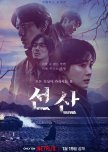
Slow paced. Gloomy. Solid crime thriller, set in a perhaps somewhat peculiar milieu
“The Bequeathed” is a dark and gloomy crime thriller that is set on the fringes of madness, obsession and shamanistic practices, taking place in a remote backcountry, where ordinary people have for generations been burying their dead under green burial mounds. It's not a horror story, but rather a solid, yet slow paced crime thriller, set in a perhaps somewhat peculiar milieu.There are only 6 episodes. Nevertheless, with only a little for the short time, comparatively much is revealed about a wildly mixed bouquet of different characters. A hodgepodge of astonishingly vividly drawn figures cross paths, take their space quite naturally and leave their traces with the audience. Against the background of the ongoing investigation into a series of murders, they all get the chance to clear up what they have (emotionally) left behind ... and move on.
I would not have expected this. Therefore I was positively surprised.
Authentic performance. Amazingly complex with haunting cinematic implementation. Dense. Suspenseful.
Nonetheless consistently gloomy. (It does get a little brighter towards the end though...)
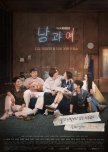
About a love that has somehow lost its suitability for everyday life over the years
“Between Him and Her” is an alternative to the tried and tested Cinderella love story, which usually ends with a supposedly “they lived together happily ever after”. Therefore, this story is about 7 years later...The KDrama is rather down-to-earth. It is set within the world of young creatives of Seoul´s fashion scene and tells about a love that has somehow lost its suitability for everyday life over the years. A love that became a habit.
Eventually, a critical moment causes the barrel of internal, unnamed, silent, consuming dissatisfaction to overflow and thus gives necessary strength to actually question everything. However, questioning everything also means having to ask yourself the unpleasant questions. Unfortunately, the answers are not clearly “yes” or “no”. They´re lurking subtly, are not always logical, nor pragmatic or even negotiable. Sometimes it's a "Yes. But." Sometimes it's a "No. But." The problem is: whether it's "yes" or "no", both are true. Love is not always automatically suitable for a partnership... and even if so, this cannot be considered a given either. Nevertheless, that doesn't make such a love any less true or valuable.
For outsiders, on the other hand, the matter may seem more evident. As a audience, we might want to shake one or the other. But in the end the answer unfolds exclusively from within the very personal, complicated emotional world of him and her. Nobody else can have a say. And the KDrama conveys that quite vividly, rather authentic and painfully realistic, too.
Accordingly, the pacing as the two protagonists are taking stock of their emotional relationship, is rather cautious and introspective. Therefore, subplots are providing some invigorating comedy and a bit of drama on the outside, thus pleasantly topping off this little study on certain facets about love.
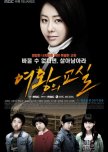
@ mobbing, friendship, class culture and reflecting moral behavior among 6th grade pupils. Great!
"The Queen's Classroom" is a dramaturgically fascinating story about kids at a South Korean elementary school, shortly before their transition to middle school. The young actors are fantastic. Likewise the adults. At the same time, it is a nuanced, clever study of bullying from 2013. I appreciate this series very much because it not only shows THAT there are enormous social problems with an increasingly traumatizing marginalization of young students, but also how/that the school, i.e. the teachers, can contribute in a creative, constructive, pedagogically valuable way, and thus counteract the trend. For this reason alone, "The Queen's Classroom" is worth seeing. In addition, the KDrama tells a wonderful story about the idea of friendship - about how the mere concept and label 'friendship' becomes a real, three-dimensional relationship with a solid grounding. Fabulous.The unique approach is a focus on the age between elementary and middle school - a phase that is crucial in the development of personality, e.g. for the cognitive development with regard to the moral assessment of situations, the ability to change perspective and a differentiated understanding of moral values. Eventually, the moral assessment of mobbing/bullying is the crucial first step in order to seriously counteract the ominous trend. This aspect is a characteristic problem in South Korean schools. (See side note below.)
In the case of "The Queen's Classroom", the homeroom teacher sets important impulses for the personal processes of individual pupils and the class as a whole with quite idiosyncratic, (of course also dramaturgically effective), provocative pedagogical methods. The aim is to use paradoxical intervention in order to trigger more profound emotional and cognitive processes, so that the students can move from the sometimes naive surface of their beliefs to their true, genuine core. On this basis only can they then stand their by all means noble, idealistic convictions powerfully and authentically against adverse circumstances. Personal processes can often be a bit painful, as is the case here. However, the result is quite spectacular for the individuals and for the class as a whole, too. It could/should be something like this or something similar, it HAS to be if the increasing trend of bullying in schools is to change.
Chapeau! "The Queen's Classroom" is boldly leading the way as a small but mighty pioneer in the KDrama world. To be fair, the KDrama is based on a Japanese production. Since the social problem is similar there, it is not surprising. In any case, the Korean remake didn't do any harm... Despite all the emotional seriousness, it's a great pleasure to accompany the kids on their bumpy road.
---------------------------------------
SIDE NOTE: --- Wang-ta - Bullying in a collectivistic society, like South Korea ---
While 'mobbing', strictly speaking, refers to psychological terror or physical violence by a group, 'bullying' describes the harassment itself, regardless of how many people take part in it. However, the choice of term does not change the fact that far too many students are involved - be it as victims, as perpetrators or as spectators/witnesses. This is an international phenomenon, with more or less extreme manifestations. There is peculiarity in South Korea, though: collectivism (vs. Western individualism). When the welfare of the collective has the highest priority, it means that the interests of the individual are subordinated to those of the associated social group - be it family, work, school, class, club, friends, etc. Peer pressure also exists in individualistic Societies, true enough, but in collectivism it has an even stronger impact. This should not be underestimated when dealing with the topic of mobbing/bullying.
'Wang-ta' is a specific, common South Korean slang term that is used in connection with and in dealing with a person who is not part of the group. One becomes an outsider very quickly, wearing the wrong clothes, having the wrong interests or preferences, belonging to the wrong group or to no group, having poor, stigmatized or less influential parents, living in the wrong family constellation or only achieving bad grades. However, this label commonly implies (in collectivist society) that it socially 'is allowed' to devalue and harass this person for being an outsider. When group norms are thus strong, such exclusion based on appearance, lack of achievement, special preferences, etc. can have particularly fatal consequences. Those experiencing 'Wang-ta' first hand, may lack the chance of getting rid of this label again.
- Those who 'choose' the victim are hardly aware of any guilt, since they are convinced, that they are rightly criticizing a deviation from the set norm.
- The other peers will thus avoid the stigmatized pupil and assume that there is something to it, so that the label (and exclusion) is justified.
- And those labeled ´wang-ta´ will only withdraw even further, ashamed of their 'apparent' lack, and feel even more inferior, than they might already do.
Empirical studies in 1998 ff with pupils from European or American countries (with individualistic socialization) showed, that in 85 percent of bullying cases peers were involved as bystanders. Of those, only 11 percent eventually intervened. Unfortunately, I don't have any comparable South Korean numbers, neither from then nor from today. However, I probably don't lean too far out of the window when I suspect that there are significantly less, who would actively intervene.
In the course of further international studies it was possible to prove that intervention by peers is, however, an essential first step towards change. Active intervention on-site in the middle of the situation triggers a (moral) debate among the peers about the situation in the first place. As long as there are only passive, tolerating bystanders, the act is socially approved and its justification defacto confirmed.
There are South Korean studies that show: although the majority of the pupils interviewed do not like bullying, at the same time they also believe that it is inevitable. In fact, they assume, that the victims in general deserve to be punished because of their (self-inflicted) being an outsider.
The peer group has the greatest influence during the school years from late elementary school to high school. At the same time, this is the phase in which generosity in dealing with diversity can and must be learned as an essential social value. If such a value is not socially recognized at that time, then young people will not be able to integrate it into their further lives, let alone apply it. This is the painful crux of the issue of "wang-ta" in South Korean schools (or later in the workplace): generosity in dealing with diversity has no tradition, no culture, no socially recognized value on the peninsula. If you want to change the school bullying trend, then you have to start here. I.e. as a teacher in elementary and middle school, opening up spaces for experience with tolerance and thus creating the opportunity for a new culture of social interaction. A confident class culture that explicitly acknowledges diversity, that socially and openly and explicitly questions wang-ta as a social option, can form the fertile breeding ground for fundamental societal changes that leave more room for individuality. In the face of an ever-approaching, globally networked world, this is becoming increasingly necessary in order to create the personal and social balancing act of a hybrid between traditional and global, between collectivistic and individualistic.
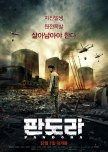
A disaster movie, yet using emotional + vivid suggestive power in the tradition of anti-war-movies
"Pandora" is a disaster movie.I don't really consider myself a fan of this genre, which focuses on mass panic and adrenaline.
However, I consider this KMovie particularly valuable.
In this case I think the makers have succeeded in doing something similar to what anti-war movies try to achieve: deterrence by vividly conveying the threatening horror. In respect to the scenario of a nuclear catastrophe the movie applies emotional and vivid suggestive power, at the same time making people think and possibly question the sense and usefulness of highly dangerous nuclear power plants.
In view of the consecutive radical change of South Korea's nuclear policy six months after "Pandora" was released, one could say: the project was worth it. (It would probably be too daring to talk about causality, but it could be considered a noticeable correlation...)
The 2016 KMovie picks up on the 2011 Fukushima nuclear disaster and, against this background, develops a story that is comparable by South Korean standards. South Korea is the country with the highest population density in the immediate vicinity of its nuclear power plants. However, due to its insular position, a realistic evacuation plan in the event of a disaster is a major problem. With the movie "Pandora" the lid of the legendary box is shaken. In this case, a nuclear power plant on the East Coast suffers earthquake damage and radiation leaks, similar to Fukushima 5 years earlier. The film fictionally exercises the processes in the event of such a catastrophe (or a comparable one) and comes full circle with a deliberately touching scene in which Kim Nam-gil makes an emphatic plea against nuclear power in his usual impressively passionate way.
Regarding such critically oriented material, the production obviously had difficulties with its financing - in South Korea the lobby of the nuclear industry is as powerful as anywhere else. Nevertheless, the ambitious project could be realized through crowdfunding.
------------------------ SIDE NOTE: --- Sobering facts/outlook on nuclear power plants in South Korea ---
"Pandora" was released in December 2016.
In early summer 2017, as one of the existing South Korean nuclear reactors was actually scheduled to be shut down, President Moon Jae-in announced that the country's nuclear-focused energy policy would be stopped and that the country would instead steer towards a nuclear-free era. Accordingly, plans to build new reactors or extend the life of existing ones have been abandoned. A sign of hope?
However, by the autumn of the same year already, the government's political commitment was no longer valid. The nuclear lobby has actually been able to exert such pressure (the President's faction not having a majority in Parliament....) and prevail that new power plants were going to be built again.
South Korea's nuclear companies make a lot of money by exporting their self-developed reactors. The companies want reference projects in their own country... it is as simple as that...
As far as the people are concerned: According to a survey by the polling institute Realmeter in 2018, 61 percent of adult South Koreans still firmly support their president’s original nuclear phase-out course. Another 10 percent tend to do so. Yet, the lobby as so often has more to say...
... To date, South Korea covers a third of its electricity needs with 24 nuclear reactors.
... There are always earthquakes on the peninsula...
------------------------

A grand historical, passionate and emotionally complex high quality drama
I´d say, “The Queen who Crowns” is an excellent, impressive historical drama that gets under your skin. An emotionally stirring KDrama of the finest quality against a historically real backdrop. The KDrama year 2025 could continue like this..."The Queen who Crowns" brings the first decades of Joseon onto the screens. It is not the first series to take on the historically dazzling personalities of that time. Those early hours of the dynasty are simply captivating. And so, with this KDrama, too, it is not boring at all. On the contrary. And with an increased age rating, "The Queen who Crowns" additionally gains necessary freedom for an not only aesthetically impressive and emotionally impactful, but at times even unrestrained narrative.
However, it doesn't hurt to be somewhat familiar with the historical background. This makes it easier to understand the connections and relationship dynamics. Yet, enjoyment of the series is also possible without prior knowledge. Explanations in the subtitles fortunately provide the corresponding context here and there.
"The Queen who Crowns" offers a grand historical and emotionally complex drama. A special nuance is peeled out of the actual historical context, closely inspected, and dramatically excellently embellished: The complex and dramatic relationship dynamics of King Taejong with his father, the abdicated King Taejo, and his wife, the later Queen Wongyeong.
------ More thoughts about the relationships between former King Taejo, Prince Bang-won and his wife -------
"The Queen who Crowns" offers, among other things, a fantastic interpretation and performance of Taejo, the founder of the Joseon Dynasty. Lee Sung-min ensures we are learning to understand that the self-proclaimed first king of the new dynasty was not only a rather dominant father but a man who truly had great things in mind for his people. The path to achieve his new dynasty was indeed bloody, the power struggle at the turn of the 14th century not yet over, and life at the royal court dangerous. The now abdicated King Taejo, however, is convincingly shown to be torn between his archetypal ideals of a strong Joseon king and the very human feelings as an emotionally entangled father. Through his son Yi Bang-won as King Taejong of this newly founded Joseon nation, he painfully reflects how low human emotions can sink. Noble ambitious monarch and defiant despot, that can be so close together.
Actor Lee Hyun-wook acting historical Yi Bang-won gives the defiant king's son his very personal touch. As a son who desperately hungers for his father's recognition. As a man who would like to wear the pants in the relationship and cannot really handle to see that his straightforward, dominant wife is superior to him in terms of political calculation, overview, and foresight. As a spoiled prince whose frustration tolerance was never really trained, who ultimately confuses defiance with power, he is trying to enforce with ferocity what thus only slips away from him even further: the respect of the two most important people in his life – his father and his actually beloved wife. Bang-won as King Taejong proves to be no counterpart to whom they can trustworthy surrender. One can feel sorry for the king. And that says it all...
Before I get to the queen, who is actually given the stage here, I would like to address one thing that is also in the focus of this KDrama along the way: The crux of the archetypal relationship between king and queen in contrast to the relationship between king and concubines. For the king, he may have both, “saint” and “whore”. The queen however, is doomed to just being the “saint”. Hardly any other historical drama I´ve seen so far had processed the dilemma and explosive dynamics of such an archetypal, almost dehumanized relationship between king and queen so emphatically. While the king gets/takes his space for being a man with needs, too, the queen, as the mother of the nation, is per definition pure and saintly. It´s bad news, if king and queen should actually love each other. There is no room for intimacy and passion in the life of a king and queen. They live an ideal of relationship that stands solely in the service of the nation. Dehumanized, so to speak. Pure archetypes. Pairing between king and queen serves only the reproduction of royal genes. Furthermore the queen´s job is about raising this offspring properly. It is a public relationship and for the nation only. It has (should have!) nothing to do with personal lust and passion. In theory at least...
Nevertheless, the king and his concubines may share their private intimacy in their bedchamber – as long as it pleases the king. And in the case of our defiant, discontented, and somewhat emotionally lost King Taejong, he rather escapes to his concubines, who are willingly serving at his whim, with a warming embrace, a tender word. There he supposedly finds the most submissive subservience, the encouragement, and all that his father and wife deny him for different reasons. In the best case, it may truly nourish him and bring him into his power. In the worst case, he may be manipulated, and thus losing even more ground.
Now to Queen Wongyeong. Chapeau to Cha Joo-young! She gives that imposing historical personality such a strong, beautiful, clever, and quick-witted aura, portraying her as a dominant yet simultaneously sensitive woman, too. It's about time that this queen, who was only historically appreciated late, now also gets the deserved attention in the KDrama orbit!
King Taejong truly had a competent, intelligent, valuable partner at his side. At eye level. In the truest sense also above what concerns convention and customs. Thus, at the same time, courageous enough to take new paths, to think innovatively, and to act fearlessly.
But woe if the king thinks he has the power by virtue of his throne only. No, he must also be able to fill this position with respected personal authority. Most of the time, Taejong is trying to enforce power and respect with force. He truly lacks the necessary personal maturity for the nation´s highest office in many places... and for this great wive. What a shame.
Queen Wongyeong, in turn, pays a high price for her ambitious demeanor and constructive political influence at the royal court: her passionate love for the king, for which there is no more place at the court. But, at least, the queen does not let this stop her from making wise decisions and prudent politics. No matter how adverse the circumstances. Without her, Taejong's reign would ultimately not have been at all, let alone being so valuable for the coming Joseon. Without her, the country would not have experienced one of its greatest kings of the Joseon Dynasty – the following King Sejong, who created, among many other things, an alphabet for his people.
Those two, they paid with their personal relationship over the years of their reign. The KDrama does a great job in recognizing and dignifying their sacrifices, efforts and accomplishments.
Ps:
Episodes 13 and 14 "The Queen who Crowns - Before Sunrise" are a kind of prequel. They begin with the end of Goryeo. It is about our two protagonists meeting and falling in love, starting to dreaming their common dream of a 'better world'... and ultimately materializing it.
This may be well-intentioned, but the dramatic quality unfortunately drops somewhat compared to episodes 1-12. It almost seems as if this was a spontaneous decision in the course of events. Somehow it was done half-heartedly only (possibly under time pressure?). Nevertheless, some striking key scenes, referred to in 1-12, are delivered here, which is nice, though.


 9
9 41
41 15
15

















